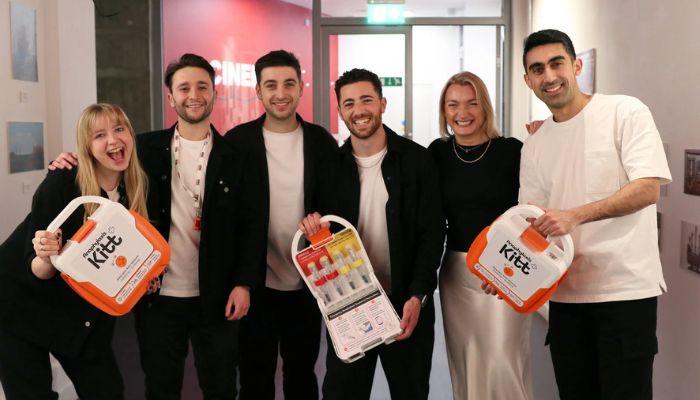Cera Care is the UK’s leading health tech startup transforming home healthcare. Using AI in healthcare, it provides quick, reactive, and low-cost care to thousands of people across the UK. Established by Dr. Ben Maruthappu and Marek Sacha in 2016, Cera currently provides its care services across 100 cities with a network of more than 10K+ caregivers is already expanding for the next few years exponentially to come!
Rather than providing hope, home care had been a source of frustration for families. Delayed visits, overlooked symptoms, and downplayed vitals resulted in avoidable emergencies. The system lacked speed, visibility, and human connection.
Ben, a doctor on the ground of policy and care, had something better in mind. He envisages tech not as a substitute, but a force multiplier for human caregivers. A solution that made care faster, predictive, and more dignified for those who needed it most.
That vision became Cera Care — a company that, in less than a decade, has helped redefine how the UK serves its most vulnerable. Combining AI innovation with humanity, Cera is setting a new standard in modern care.
Also Read: Redefining Elder Care and Companionship – Story of Papa.com
The Problem: A Healthcare System at Capacity
Before Cera Care, the U.K.’s home health industry was under enormous pressure. More than 1.4 million older people required assistance, but resources were inadequate and a lack of effective systems to serve them properly.” Demand was growing, but not enough infrastructure.
Traditional providers relied on outdated methods — manual scheduling, paper logs, and slow reporting. It used to be that care was reactive instead of being proactive, especially in emergency circumstances. Carers lacked access to real-time data, making early intervention nearly impossible.
Most importantly, patients and families felt disconnected and uncertain. The funds were largely spent with no window into care routines, and trust was quickly eroded. This was not just a matter of logistics for Dr. Ben Maruthappu — this was not just an operational failure — it was a deeply human problem that demanded a better solution.
The Genesis: Two Founders, One Bold Vision
Ben teamed up with Marek Sacha, a Czech entrepreneur who had previously led the creation of Rohlik.cz, a grocery delivery startup. Ben was able to bring European healthcare expertise and knowledge of the UK system, while Marek’s offered a deep understanding of operations, scalability, and digital-first thinking.
Together, they formed a simple but ambitious thesis:
“What if we could bring hospital-level care into the home — powered by real-time data and delivered with compassion?”
That concept soon became Cera Care — a service that would digitise end to end home care, applying AI and predictive analytics through mobile technology to provide more control in the hands of carers for better patient outcomes.
Starting Small: One Borough, Five Clients
Cera did not launch with splashy PR or sky-high valuations. It started with five clients in a single London borough.
They were trained on the mobile app, which kept track of details for each visit — vitals, medications, and mobility levels, as well as mood, every day. That information was processed by an algorithm identifying early signals of decline.
At first, there was scepticism. Could tech really be employed in something as human-focused as caregiving?
But slowly, the results spoke:
- Hospitalisations were reduced.
- Appointments became more reliable.
- Families were updated in real time.
Word spread. Councils noticed. Cera started scaling.
The Struggles: Selling Tech in a Traditional Industry
The road was not smooth. Homecare in the UK is highly regulated and often slow to adopt innovation. Securing contracts from local councils required not just technical competence but long-term relationship-building.
Traditional care providers also pushed back against Cera’s model, which they thought was too radical.
It was not easy scaling, but still feeling empathetic from the inside. Cera had to be able to train thousands of caregivers — many with limited tech experience — on how to use apps, dashboards, and digital logs.
What they had learned was that technology needed to become invisible, and that the focus must always remain on people.
AI in Healthcare: Predicting Illness Before It Happens
The defining moment for Cera was when it figured out a way to use artificial intelligence models that offered predictive care in ways hospitals rarely could.
By analysing patterns in logs from caregivers — such as skipped meals, increased confusion, or subtle changes to speech patterns— Cera’s platform could predict that an individual might be about to have a health crisis within the next 7 days.
This allowed for early interventions such as:
- Medication changes
- GP check-ups
- Lifestyle adjustments
The platform evolved into what some called the “Alexa for Healthcare”— an infallible intelligence that quietly works from behind, keeping patients safe.
Scaling Up: A Fast-Growing UK Health tech Startup
Between 2018 and 2023, Cera Care made the extraordinary journey of going from startup to one of the largest care providers in the UK. It accelerated growth through key acquisitions, including Mears Care and Sunderland Home Care, allowing the company to expand rapidly and deepen its footprint across the country.
By this time, Cera was working in more than 100 towns and cities, covering people who had received over 50 million home care visits. Its team had grown to over 10,000 carers and nurses, all supported by its AI-driven platform that streamlined operations and improved care outcomes.
In 2024, the company raised more than $320 million from prominent investors such as Kairos Ventures, Guinness Asset Management, and Peter Thiel. What had once been a health tech startup was now serving as an essential component of the UK’s digital home healthcare infrastructure.
Beyond Technology: Training the Caregivers of the Future
What truly sets Cera apart is its dual commitment to tech and people.
The company launched Cera Academy, an in-house training platform that upskills caregivers not only in basic care, but also in digital literacy, dementia handling, and emergency protocols.
Carers now earn certifications, improve earnings, and grow careers — all through an app on their phone.
“The idea isn’t to replace carers with AI,” says Dr. Maruthappu.
“It’s to give them superpowers.”
This blend of compassion and capability became Cera’s secret sauce.
Impact and Recognition
Cera’s model demonstrated that health tech could revolutionize the delivery of care. It moved up the delivery of services 10x faster, decreased hospitalizations by 52%, and lowered care costs by almost one-third. This was not simply innovation — this represented a radical rethinking of how care could be accessed and scaled.
During COVID-19 pandemic, Cera had increasingly become a critical safety net as hospitals filled. Its digital platform is used to keep care going safely at home instead of sending patients into waiting rooms or clinics, potentially exposing tens, in some cases even hundreds, and thousands. What was once questioned became invaluable — a trusted component of the U.K.’s healthcare response.
Next Story: Tricog Health: Revolutionizing Cardiac Care with AI
Looking Ahead: The Future of Home Healthcare
Cera is not stopping in the UK. Now the company is looking to expand into European markets, particularly those where there are urgent needs stemming from aging populations and fragmented care systems. Its vision is global and firmly grounded in preventive, tech-driven care.
To help in this effort, Cera is developing integrations with wearables to monitor vitals during recovery and remote monitoring tools for post-recovery care, as well as mental health support both for patients and carers. By the middle of 2025, it began investing into artificial intelligence for early dementia detection — a bold step toward predictive and preventive health care.
Conclusion: A Healthcare Revolution, One Visit at a Time
Cera Care did not disrupt healthcare by following trends — it did so by listening. It empowered caregivers and responded to real patient needs, using AI for impact, not hype. Its originality was in service of something, not just for publicity.
In a world increasingly strained by aging populations, Cera shows that real transformation is not about more new hospitals — it is about empathy and consistency and courage. The outcome is care that is proactive, data-driven, and deeply human.




